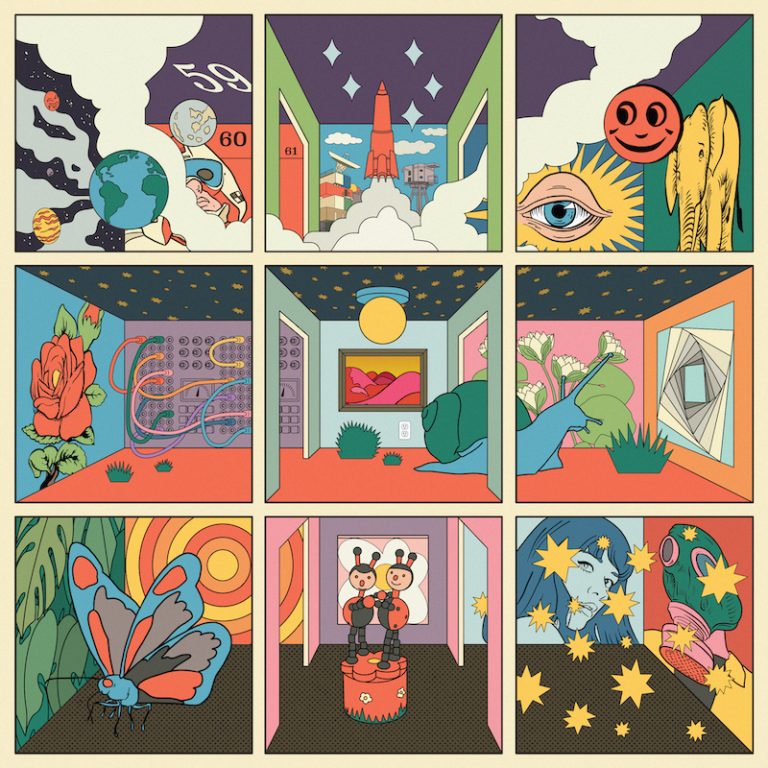From their conception, STRFKR have always been playing with push and pull. Their name represents “all [we] didn’t want to be a part of, all [we] didn’t want to do”, and their ethos for their music was to make “dance music that you can actually listen to.” STRFKR want you to have a blast, but they also want to sing about death and existence and stuff; spoken word snippets of philosophers like Alan Watts have found their way onto most of their albums, and are a bridge between songs during their renowned and energetic live shows. At their best, they hit the mark, making lasting music to dance along to and uplift your day that also had a ponderous core (should you be inclined to dissect the often fuzzy, reverberated vocals).
The downside is that this shtick soon got old, and after the band’s self-titled debut, it felt like they were just flashing bright lights to distract from this problem. While the band have made strides (their last album, 2016’s Being No One, Going Nowhere, made a good effort of making introspective, stargazing party music for your bedroom), the world has moved at faster pace. It’s been four years since STRFKR’s last album, and while that time hasn’t been fruitless (the band have released three albums of demo material, a live album, and various singles), it feels very reasonable for casual listeners to have completely forgotten about the band.
Cue Future Past Life, the band’s latest, and the first album by the band where “every song is driven by acoustic guitar.” Long story short: principal songwriter/lead vocalist Josh Hodges met some like-minded musicians in Amsterdam, and, after returning home to the States, decided to build up these songs with his band in his home studio. It’s easy to hear the original ideas of the songs and picture Hodges singing with a guitar in hand as his band works some substance into the mix. Despite the acoustic core (which isn’t entirely new territory for the band), the good news for fans old and new is that these still feel like STRFKR songs, for the most part. The bad news is that none of them are especially good STRFKR songs.
Take “Deep Dream” as an example. It’s flush with plenty of decoration, from starry synth ripples to busy bass work, but it all feels like it’s trying to distract from a song vacant of real heart. It’s not bad, but after the initial burst in the opening seconds, it’s almost entirely forgettable. “Budapest” suffers a similar fate: it’s all the bouncy energy but the contribution from label mates Shy Boys is lost and indistinguishable from STRFKR’s usual sonic territory. The title of “Better Together” comes off as ironic as each band member sounds like they are going off in a different direction as Hodge’s broody, breathy singing with his guitar strums fails to offer something worth building on.
There are flashes of joy. Lead single “Never The Same” weaves acoustic guitar with a hopping beat nicely, mixing together major and minor chords pleasingly. “Second Hand” casts a dour image of modern worry with its lyrics (“I’m feeling sick again / Been reading Web MD / It must be cancer then / Don’t know what’s wrong with me”), but it’s nonetheless reluctantly catchy. And “Sea Foam” sounds like it’s building on the elastic, lonely club jitters of “When I’m With You” from the band’s last album.
These are flashes though, and it felt like a lot of work to get to such kind words. Listen after listen to this album felt like a slog through beige background indie music, and only if you spend time with it, you might find a nugget coming back to – but it’s hard to imagine anyone who’s not a devoted fan doing that. It’s not a difficult album so much as a difficult album to truly and carelessly enjoy.
And let me be clear, too: I am all for giving the benefit of the doubt to the band. I still adore the bright infectiousness of “German Love” and other hits from all their albums, and I even revisit the better moments on the bloated Miracle Mile more than most. There might be outward steps here on a sonic level (the retro, faded VHS sound on opening track “Dear Stranger”, or the formless and aimless crackling mush of closing track “Cold Comfort”), but equally there are moments that just feel entirely unrequired (the lonely “Palm Reader” where it sounds like Hodges is doing his best to be moody and gritty, or the inclusion of someone having a coughing fit at the end of “Pink Noise”, which is like a needless, anxiety-inducing joke during these times).
With Future Past Life it feels the band are giving listeners an album that is stuck between the demo stage and the mastering phase. “I wanna know what’s inside us / Even if it’s only silence,” Hodges fittingly sings on “Budapest”, capturing the zeal to find the gold from those original Amsterdam jam sessions. A noble thought for the creative mind, but that doesn’t mean the exploratory process is interesting for listeners. Some of those ideas Hodges had in Amsterdam are worth exploring with his band and sharing with the world, sure, but otherwise it feels very much like what happens in Europe should have stayed there. Just because the band might feel pushed to produce some new music doesn’t mean they should be pulling stuff from the bottom of the creative barrel.

